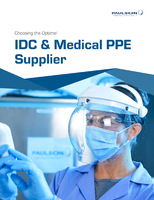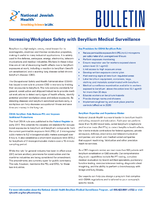IPC Study shows an industry gaining strength.
Share:
Press Release Summary:
With data from representative sample of electronics OEMs, EMS companies, PCB manufacturers, and suppliers, Fast Facts Survey reveals strategies companies are using to weather recession, recession's impact on their relationships with suppliers, and how they measure success. Based on results of survey, electronics manufacturers are responding to recession with constructive and forward-looking initiatives, such as targeting new markets and developing new products and services.
Original Press Release:
IPC Study on Recession-Fighting Strategies Shows an Industry Gaining Strength
BANNOCKBURN, Ill., USA, August 28, 2009 - IPC - Association Connecting Electronics Industries® has released the results of its latest Fast Facts survey, Survival Strategies and Success Measures in the Electronics Industry. With data from a representative sample of electronics OEMs, EMS companies, PCB manufacturers and suppliers, the survey reveals the strategies companies are using to weather the recession, the recession's impact on their relationships with suppliers, and how they measure success.
Based on the results of this survey, electronics manufacturers are responding to the recession with constructive and forward-looking initiatives, such as targeting new markets and developing new products and services, to increase revenue. These initiatives will help them emerge from the recession with more potential customers and new offerings in the pipeline, and the benefits will be long lasting. They are also making long-term investments in process improvement, staff development and upgrading facilities and equipment.
On the cost-reduction end, changing suppliers or renegotiating supplier contracts was the most highly rated strategy for its impact on the bottom line. Administrative decisions such as salary freezes and travel cuts were also cited among those having the highest impact.
In addition to tracking basic revenue and profit, most companies in the industry also measure their sales growth rates, cost of goods sold as a percent of sales, and return on sales.
The companies' responses on sourcing indicate that price has become a more important criterion for most electronics companies and there is more competitive pressure on suppliers now than there was a year ago.
Commenting on what he sees occurring as a result of the recession, a PCB manufacturer in Asia said there is "more competition, more deals, more under the table offerings, and more failures." A diversified manufacturer in North America sees the recession causing "continued pressure to relocate low-end products to lower cost regions for manufacturing."
On the bright side, an Asian manufacturer sees the recession driving "growing demand for green technology home appliances, such as air-conditioners, refrigerators, washing machines, lighting and solar-power equipment." This represents a new and growing market for appliance manufacturers and their suppliers. A European manufacturer commented that "the most significant development over the past three months has been the increasing demand for new products . . . and this augurs well for 2010."
Fast Facts surveys are designed to collect and turn around information quickly on topics of current interest to the industry. The complete report on the results breaks the findings down by industry segment, region and company size. Survival Strategies and Success Measures in the Electronics Industry is available free to IPC members at www.ipc.org/strategy-and-metrics-report-2009. It is available for sale to nonmembers for $75 at IPC's online store at ipc.org/onlinestore.
About IPC
IPC (www.IPC.org) is a global trade association based in Bannockburn, Ill., dedicated to the competitive excellence and financial success of its 2,700 member companies which represent all facets of the electronics industry, including design, printed board manufacturing, electronics assembly and test. As a member-driven organization and leading source for industry standards, training, market research and public policy advocacy, IPC supports programs to meet the needs of an estimated $1.7 trillion global electronics industry. IPC maintains additional offices in Taos, N.M.; Arlington, Va.; Garden Grove, Calif.; Stockholm, Sweden; Moscow, Russia; and Shanghai and Shenzhen, China.




